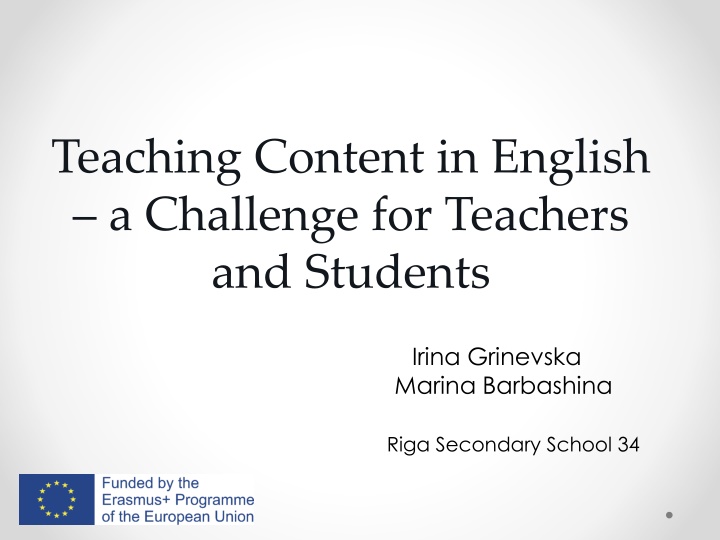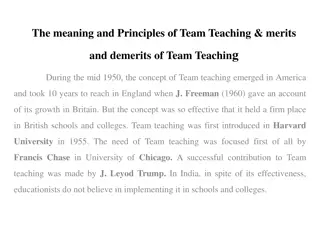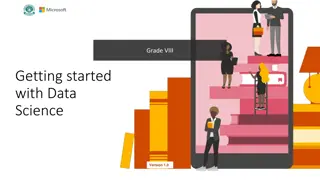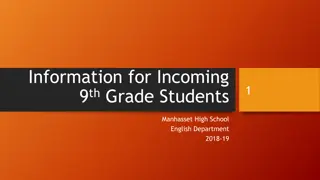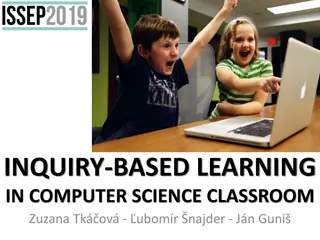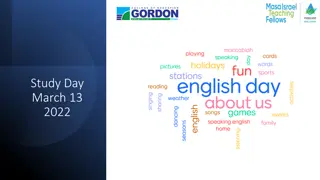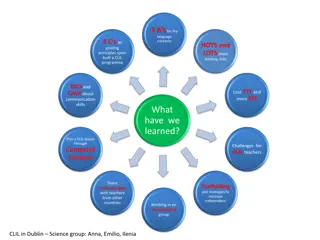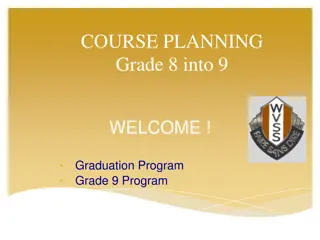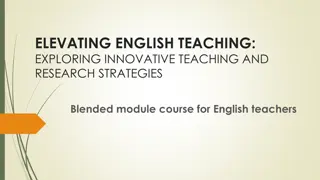Challenges and Benefits of CLIL in Teaching English and Science for Grade 5 Students
Using Content and Language Integrated Learning (CLIL) as an educational approach presents challenges and opportunities for teachers and students alike. This method involves teaching both content and language in an additional language, such as English. The CLIL program designed for Grade 5 students includes topics like Science lessons, vocabulary building, receptive and productive language skills development, and exploration of various science subjects. The program aims to enhance students' understanding of English and science in an integrated manner, fostering a holistic approach to education.
Download Presentation

Please find below an Image/Link to download the presentation.
The content on the website is provided AS IS for your information and personal use only. It may not be sold, licensed, or shared on other websites without obtaining consent from the author.If you encounter any issues during the download, it is possible that the publisher has removed the file from their server.
You are allowed to download the files provided on this website for personal or commercial use, subject to the condition that they are used lawfully. All files are the property of their respective owners.
The content on the website is provided AS IS for your information and personal use only. It may not be sold, licensed, or shared on other websites without obtaining consent from the author.
E N D
Presentation Transcript
Teaching Content in English a Challenge for Teachers and Students Irina Grinevska Marina Barbashina Riga Secondary School 34
CLIL- Content and Language Integrated Learning is a dual-focused educational approach in which an additional language is used for the learning and teaching of both content and language. Mehisto, Marsh and Frigols (2008, p.9) ... involves using a language that is not a student s native language... (ibid. p.11)
4Cs Science CONTENT Social studies LOTs COGNITION HOTs THEME Lexis COMMUNICATION Forms of Language Classroom Language CULTURE
Designing a CLIL program for teaching English and science for Grade 5 students Making a plan together with a science teacher Content !!! Language is only the instrument Vocabulary; Receptive (reading and listening comprehension) skills; Productive (speaking for discussing, predicting, presenting projects, writing) skills;
Designing a CLIL programme for teaching English and science for Grade 5 students Topics Science lessons 74 lessons CLIL lessons 37 lessons 4 lessons What we ll learn 2 lessons 6 lessons 3 lessons Flying 8 lessons 4 lessons Solar System 10 lessons 5 lessons Materials and their Properties 4 lessons 2 lessons Heat and Fuels 6 lessons 3 lessons Light and Sound 6 lessons 3 lessons Plants 8 lessons 4 lessons Animals 10 lessons 5 lessons Humans 8 lessons 4 lessons Earth 4 lessons 2 lessons Habitats
Write down ten nouns related to water Write down ten nouns related to water as quickly as you can. as quickly as you can. Write down as many nouns related to water Write down as many nouns related to water as you can in two minutes. as you can in two minutes.
groundwater groundwater precipitation precipitation condensation condensation evaporation evaporation runoff runoff transpiration transpiration Guess the Guess the topic. topic.
The The Water Water Cycle Cycle Accumulation
References References Coyle, D., Hood, P., & Marsh, D. (2010). CLIL: Content and language integrated learning. Cambridge: Cambridge University Press. Dale, L., & Tanner, R. (2012). CLIL activities: A resource for subject and language teachers. Cambridge: Cambridge University Press. Mehisto, P., Marsh, D., & Frigols, M.J. (2008) Uncovering CLIL: Content and language integrated learning in bilingual and multilingual education. Oxford: Macmillan. Ur, P. (2012). Vocabulary activities. Cambridge: Cambridge University Press.
1. Pre-reading activity (pre-teaching the new words) force pressure to increase to decrease lift thrust drag gravity engine current shape forward 2. While-reading activity (label the picture)
3. After-reading activity Fill in the gaps Match the terms and definition Synonyms Vocabulary LOTs Preparation for Listening
3. Listening https://youtu.be/bGtyR6Ah5xQ
Principle of Bernoulli (experiments) Fold a piece of paper in half to make a tent. Place the paper tent on the desk. Using a straw, blow under the tent and observe what happens. Blow harder and observe what happens.
Assessment in CLIL Assessment for learning success criteria Success criteria help teachers to decide whether their students have in fact achieved the learning intention Clear and transparent criteria, which are SMART. S Specific M Measurable A Achievable R Realistic T Time bound
Assessment Criteria Label the forces, which influence the plane during the flight. Give the definitions to the forces. Use the TL vocabulary in the context Understand that the Bernoulli s principle applies in any situation in which air is moving. Understand the Bernoulli s principle, which states, the faster the air is moving, the less pressure it has. Understand, that during the flight the pressure under the wing is greater than the pressure above the wing. Solve the problems, using the principle of Bernoulli.
Research on students motivation and wellbeing during CLIL lessons Riga Secondary School 34 Spring 2015 spring 2016 148 Grade 5 and Grade 6 students 6 teachers Data collection method - questionnaire
Grade 5 Students motivation during integrated science and English lessons in 2015 and 2016 years.
Grade 5 and 6 Students wellbeing during integrated content (science and social studies) and English lessons in 2015 and 2016 years
Grade 5 and 6 Students attitude towards raising their content and language proficiency during integrated content (science and social studies) and English lessons in 2016
Subjects preferred by Grade 5 and Grade 6 students during CLIL lessons Grade 5 Grade 6 History 34 (48%) Social studies21 (30%) Computers 20 (28%) Maths 7 (10%) Sports 9 (13%) History 39 (51%) Maths 23 (30%) Biology 22 (29%) Geography 12 (16%)
Research on teachers wellbeing during CLIL lessons (advantages) the students attitude towards integrated content and English learning is positive learning content in English helps to motivate students for learning English learning new information on content (personal development) increasing the vocabulary using new methods of teaching English
Research on teachers wellbeing during CLIL lessons (drawbacks) difficult terminology lack of text books laborious adaptation of texts for students lack of technical equipment in the classrooms
Research on teachers wellbeing during CLIL lessons (possible solutions) practical CLIL courses organisation possibility to attend courses on the subject (may be in English) English language courses for subject teachers communication with the colleagues from other schools and countries
Questions?! Irina Grinevska Marina Barbashina
Designing a CLIL program for teaching English and social studies for Grade 6 students Motto: I am a part of the whole world Motto: I am a part of the whole world Rights and Obligatons of Children; Personality Traits and Intelligence Types Cultures Economics
